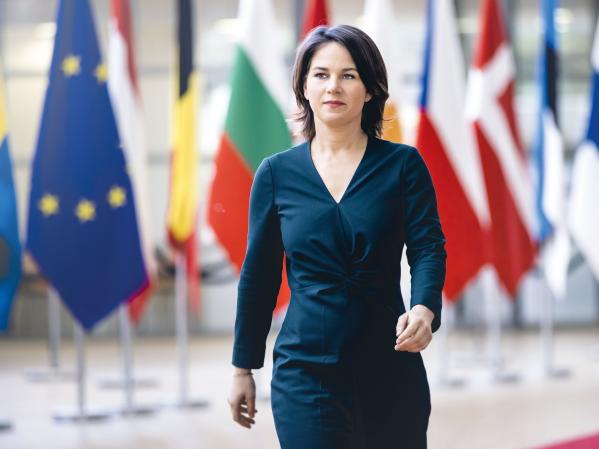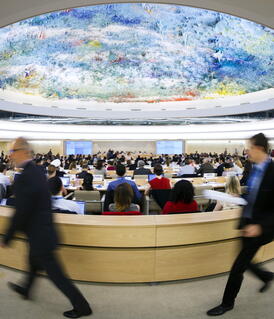Shared responsibility

As the fourth-largest economy in the world and the largest member of the European union European Union In 1957, Germany was one of the six founding members of today’s EU, along with France, Italy, Belgium, the Netherlands and Luxembourg. The EU is currently made up of 27 states; the euro is the official currency in 20 of them. For Germany, European integration forms the basis for peace, security and… Read more › , Germany is well aware of its international responsibilities. Through its foreign, security and defence policy, the Federal Government Federal Government The Federal Government and cabinet is made up of the Federal Chancellor and the Federal Ministers. While the Chancellor holds the power to issue directives, the ministers have departmental powers, meaning that they independently run their respective ministries in the framework of those directives… Read more › aims to work closely with democratic partners in order to defend shared values and counter global challenges such as climate change and the Covid-19 pandemic. A key pillar of this is the EU as a project to promote peace and freedom, where Germany plays an active role in shaping the Union’s future. Germany has close ties with France through their historic partnership. This mutual friendship and cooperation is considered a driving force behind the European Union European Union In 1957, Germany was one of the six founding members of today’s EU, along with France, Italy, Belgium, the Netherlands and Luxembourg. The EU is currently made up of 27 states; the euro is the official currency in 20 of them. For Germany, European integration forms the basis for peace, security and… Read more › . The “Weimar Triangle” serves as an important forum for Germany’s cooperation with France and Poland. Germany is also rooted in the shared values that underpin the transatlantic alliance with the USA.
Germany is also part of an active and diverse network in wider
international politics. It maintains diplomatic relations with almost 200 countries and is a member of a range of multinational organisations and informal coordination groups such as the Group of Seven (G7). Annalena Baerbock (Alliance 90/The Greens) has been Federal Foreign Minister since December 2021. Around 12,000 people work for the Foreign Service, which has its headquarters in
Berlin
Berlin
Once a year, during the Berlinale film festival, the world of the silver screen focuses its attention on Berlin. And the city’s inhabitants are used to global interest. After all, the people of Berlin have lived in a capital city since 1458. However, there is also a shady side to the city’s history…
Read more ›
. Germany maintains 226 diplomatic missions.
The overarching goal of German foreign policy is to maintain peace and security around the world. One of its guiding principles is comprehensive integration into the structures of multilateral cooperation. In concrete terms, this means developing constructive partnerships with EU member states and transatlantic partners, supporting Israel’s right to exist, making an active and committed contribution to the UN and the Council of Europe, and strengthening European security architecture through the Organization for Security and Co-operation in Europe ( OSCE OSCE With its 57 member states, the Organization for Security and Co-Operation in Europe (OSCE) is a comprehensive forum for cooperation at the pan-European level. OSCE missions are active above all in conflict prevention and management. Germany makes a substantial contribution to finance and man-power… Read more › ).
Upholding human rights
Human rights Human rights The respect and strengthening of human rights worldwide are a cornerstone of German Federal Government policy. Together with its EU partners it is committed to protecting and continually advancing human rights standards throughout the world. This occurs in close collaboration with the institutions… Read more › are the foundation of German foreign policy. Article 1 of the Basic Law The Basic Law The Basic Law determines that Germany is a constitutional state: All state authorities are subject to judicial control. Section 1 of the Basic Law is of particular relevance. It stipulates that respect for human dignity is the most important aspect of the constitution: “Human dignity shall be… Read more › states that “Human dignity shall be inviolable”. Germany therefore works with partners around the world to achieve this. This is not just a moral obligation, it is also in Germany’s foreign policy interests, as preserving human rights Human rights The respect and strengthening of human rights worldwide are a cornerstone of German Federal Government policy. Together with its EU partners it is committed to protecting and continually advancing human rights standards throughout the world. This occurs in close collaboration with the institutions… Read more › contributes to peace and stable development.
Germany champions a broad view of security that encompasses sustainable economic, environmental and social issues alongside crisis prevention, disarmament and arms control. It includes promoting globalisation with opportunities for all, cross-border environmental and climate protection, intercultural dialogue, as well as encouraging hospitality to visitors and immigrants. This holistic approach also includes the Federal Government's pledge to make feminist foreign policy a reality. This focuses on strengthening the rights, resources and representation of women and marginalised groups, as well as promoting diversity.
As part of multilateral organisations and relationships, Germany has shouldered the increased responsibility that has fallen to it since reunification in 1990. Through wide-ranging and ever-increasing efforts, Germany now contributes to stabilising crisis regions and finding political solutions to conflicts. It also helps maintain peacekeeping structures, as well as playing a role in crisis management by contributing personnel to UN peace missions.
Germany also provides humanitarian aid to crises, conflicts and natural disasters to help people in acute distress. Germany also works with UN organisations, the Red Cross and Red Crescent organisations, and NGOs. Germany aligns its development activities with the sustainable development goals set down in the
United Nations
United Nations
The United Nations (UN) has a key role to play in the international system. Germany has been a UN member since 1973. Since joining, Germany has taken on more and more responsibility and is now one of the largest donors and supporters of the United Nations. For example, Germany is the second largest…
Read more ›
’ Agenda 2030. The 17 goals include combating hunger and poverty, promoting climate protection and achieving gender equality.
Germany’s G7 presidency 2022
In 2022 the Federal Republic took its seventh turn as leader of the G7, the group of seven leading industrial nations and democracies. In partnership with France, Italy, the United Kingdom, Japan, Canada and the USA, Germany faced up to its responsibilities during its presidency. The Federal Government Federal Government The Federal Government and cabinet is made up of the Federal Chancellor and the Federal Ministers. While the Chancellor holds the power to issue directives, the ministers have departmental powers, meaning that they independently run their respective ministries in the framework of those directives… Read more › chose set itself the goal of “Progress for a just world” in its programme. The priorities included future global alliances and structures, climate protection, global health, social justice and equality.

